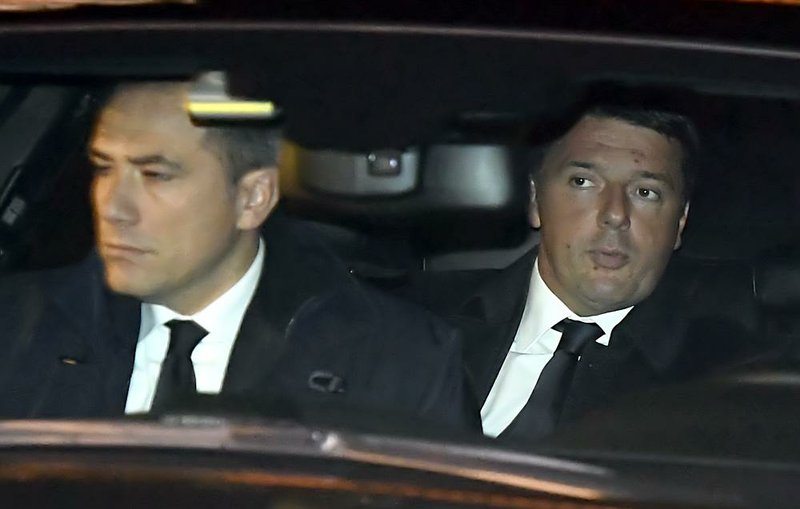ROME -- A day after Italians overwhelmingly rejected a constitutional overhaul on which he had staked his tenure, Prime Minister Matteo Renzi, 41, made a somber visit Monday evening to the Quirinal, once home to popes and now to the president of the Italian Republic, to formally tender his resignation.
The president, Sergio Mattarella, asked him to postpone his departure for a few days while his government finished a budget. Renzi agreed.
The immediate question is whether the president, usually a ceremonial figure, would form a caretaker government staffed with technocrats, persuade rival political parties to form a coalition government or call for new elections in 2017.
The election option is thrown into doubt by an electoral law approved last year, which is under court review and may now be obsolete after Sunday's referendum.
For Italians, who have seen 63 governments in 70 years, Monday's resignation made for a ritual as familiar as the morning espresso.
"It's not a new thing," said Massimo Franco, a political columnist at the Corriere della Sera newspaper who said the transition toward new elections would probably last at least eight months but as long as a year and a half. "Italians aren't shocked."
Instead, Italians found themselves drafting another political autopsy report, this time to understand what did Renzi in. Some pointed to a sluggish economy that failed to deliver the jobs and prosperity he promised. Others spoke about their sincere disagreements with Renzi's constitutional overhaul. Many attributed Renzi's downfall to haughtiness and to tying his political fate to that of the referendum. And just about everyone agreed that a strong anti-establishment wave had washed Renzi out.
But unlike in Austria, France and Germany, where populist parties have taken on a rightist and anti-immigrant edge, Italy's homegrown anti-establishment party, the Five Star Movement, is distinct. An Internet-based and ideologically unorthodox party, with socially liberal, economically populist and tough law-and-order views, the Five Star Movement is led by comedian Beppe Grillo.
In recent months, the party has won mayoral elections in cities such as Rome and Turin and vigorously campaigned against Renzi's overhaul.
On Monday, party members celebrated his resignation and acted as the victors of the referendum.
Yet anointing the Five Star Movement as Italy's next power overlooks the complexities of Italian politics.
To overthrow Renzi, the Five Star Movement made common cause with other parties aligned with the Italian establishment, including lifelong officeholders and others such as former Prime Minister Silvio Berlusconi, as well as leftist leaders and recipients of public benefits and labor protections.
But now those powerful interests of the left, right and center appear poised to return to business as usual, dividing power among themselves and threatening to shut out the Five Star Movement, which refuses, per its party's purity laws, to form political alliances.
"They think they won but they are actually the losers," said Roberto D'Alimonte, a political scientist at Luiss Guido Carli University in Rome who has advised Renzi on changing election laws. "They don't want to make alliances. They are stuck."
For months, Five Star leaders excoriated the so-called Italicum, the electoral law Renzi had passed to bring more stability to Italian governments. It created a runoff system between national candidates that awarded the winner a bonus of seats in the lower house of Parliament, giving the electoral winner a parliamentary majority.
But the electoral law was intended to complement the constitutional changes on Sunday's ballot, which would have streamlined Parliament by reducing the power and size of the Senate.
Before Sunday, Grillo and other members of his party called the electoral law an invitation to dictatorship. But immediately after Renzi's defeat, Grillo had changed his mind.
"The fastest, most realistic and concrete thing to do is immediately hold a vote with the law that already exists, the Italicum," Grillo wrote on his blog, while acknowledging "we've always criticized this law."
The more likely option now, according to several analysts, is that Mattarella would form a new coalition government most likely led by a member of Renzi's Cabinet.
Mattarella will almost surely demand that any caretaker government he appoints reconcile the electoral law before he sets a date for early elections, they said.
When that time comes, Renzi has a path to return to power. He lost 60 percent of the vote in Sunday's referendum -- yet that 'No' vote belongs to many parties, not just one. For now, Renzi's immediate fight is to retain his position as leader of his Democratic Party.
"It would be more destabilizing if he steps down as party leader than as prime minister," D'Alimonte said.
A Section on 12/06/2016
